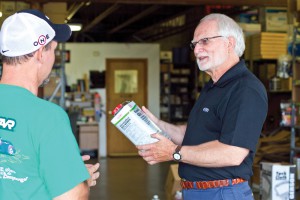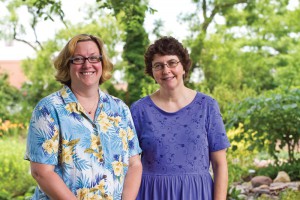It was bitterly cold the week in February 1994, when Terry Whitmore ’70, MBA – then teaching business classes as an adjunct instructor – and a few others traveled from EMU to Spring Arbor University in Michigan to study its adult learning program.
EMU had considered launching a program targeted at adults returning to school, but the concept had yet to sweep higher education, and doubts existed as to whether it would work in Harrisonburg. The trip to Michigan, though, put most of those questions to rest.
“When I left … I was hooked,” said Whitmore.

In January 1995, Whitmore began teaching EMU’s first classes offered through its Adult Degree Completion Program (ADCP); the program’s first graduates earned their bachelor’s degrees in 1996. Whitmore has been with ADCP ever since, teaching core segments of the management and organizational development curriculum.
Over the past decade and a half, ADCP has developed into one of EMU’s largest and most important academic programs. At the May 2011 commencement, 119 of 320 undergraduate degrees conferred by EMU, or close to 40 percent, were awarded to ADCP graduates. In recent years, the proportion of ADCP graduates to EMU’s total number of undergraduates has averaged from one-quarter to one-third, and more than 1,000 adults have earned their degrees through the program.
Whitmore, who also works full-time in his family business, E&M Auto and Paint Supply, said the most rewarding aspect of teaching ADCP students for the past decade and a half is the depth and breadth of experience students bring to the classroom. In any given class, he said, culturally disparate persons from their mid-twenties to as-old-as-they-care-to-be students, learn from each other’s years or decades of work experience
in education, government, finance, health care, manufacturing and other fields.
The program, he said, has a special focus on curriculum with direct and immediate application to work environments. Students are encouraged to use their varied life experiences to inform and augment academic or theoretical class materials.
Of course, the students benefit from the rich experiences of the staff too. Adjunct instructor Edgar Miller ’76, for example, not only holds an MEd in psychology – plus MBA coursework – he is general manager of Truck Enterprises Inc., a thriving family-owned business in three states.
The rise of EMU’s ADCP has been part of a national trend to meet a huge need. In 2010, according to the Lumina Foundation for Education, 37 million working adults in the United States – that’s nearly a quarter of the country’s adult workforce – had started college but never finished. In Virginia alone, there are now 20 different college degree completion programs for adult students, according to the State Council of Higher Education for Virginia.
“It’s been a privilege to be a part of this wave of adult learning in higher education,” said Carolyn Stauffer ’84, PhD, a professor in EMU’s department of applied and social sciences who teaches cross-cultural courses at ADCP. “It’s really a process of co-creation of knowledge and wisdom in the classroom. Each of the students is bringing a richness of life experience to the classroom, and together, we create that knowledge.”
The cross-cultural coursework required of ADCP students – as of all undergraduates at EMU – is just one of the features that distinguishes
it from other degree completion programs. Additionally, the EMU program in Harrisonburg includes a Bible class that concludes with a question-and-answer session on the Mennonite and Anabaptist tradition, usually led by EMU President Loren Swartzendruber ’76, MDiv ’79, DMin. Given that more than 95 percent of ADCP students enroll knowing little or nothing about Mennonites, this Q&A allows them to understand the roots of EMU’s “service oriented” education.
Most distinctive, though, is the university’s “cohort-based” approach to adult learning, in which a group, or cohort, of adult students start and finish the program together, usually meeting one night per week. The once-weekly class schedule is designed to fit around adult students’ work and family commitments, while the practice of keeping ADCP students in their own classes, rather than sprinkled into traditional undergraduate classes, is intended to create a comfortable, productive learning environment.
EMU now offers two majors through ADCP: a BS in nursing degree for working RNs, and a Management and Organizational Development (MOD) program for students from a broad array of careers. In Harrisonburg, two BSN and two MOD cohorts start each year. Additionally, three to five BSN cohorts are offered through EMU’s Lancaster, Pennsylvania, satellite campus. (MOD was also once offered in Lancaster, but has been discontinued
because of insufficient enrollment). More than 1,400 people have come through these programs since 1995.
“The cohorts were very tight. I didn’t know anybody when I started that program, but soon I learned about people’s families, and what they were doing and where they were going. We stuck together and pulled each other through,” said Karen Jagiello ’04, a graduate of the BSN program who has since earned her master’s degree and, in 2010, returned to teach an ADCP nursing class.
A challenge presented by the cohort model, Whitmore noted, is that ADCP can seem isolated from other programs of the university. That’s an issue he plans to work on in the coming year as a member of EMU’s faculty senate. Nevertheless, the cohort model has served ADCP students extremely well. Almost all of the students who enroll in ADCP remain within their particular cohort to the end, said Margo McIntire ’98 BS (ADCP), MBA ’08, academic adviser at ADCP.
The MOD cohorts, limited to 25 students, last 15 months and cost $14,600, while BSN cohorts, capped at 22, last 18 months and cost $15,650. Those fees include the cost of books, which ADCP purchases and hands out to students on their first day of class, according to Sue Cockley, PhD, ADCP director. In an effort to assist ADCP students with large financial needs, the Whitmore family set up the Richard M. Whitmore Endowed Scholarship Fund in memory of Terry’s brother, who died at age 51 in 1999.
“We’ve made a really concerted effort to remove all the non-academic barriers to getting a degree,” said Cockley, who noted that staffers personally handle registration for each student.
While ADCP has occasionally offered an extra cohort, current staffing levels and limited facilities restrict the program’s ability for immediate growth. Even so, discussions about expanding ADCP over the long term are occurring, Cockley said. “We are now exploring adding various certification programs that could be taken as part of an ADCP degree, or as a shorter, stand-alone program for students seeking various professional certificates.”
Today, with ADCP firmly established at EMU, and with degree completion programs generally enjoying greater prominence, Stauffer and Whitmore noted that lifelong learning is becoming central to higher education in the United States. Correspondingly, Stauffer said, the perception
that adult college students are simply playing catch-up is dated and false.
“They’re bringing significant life and professional experience to the table, and they are retooling themselves because the environment around them is constantly shifting,” Stauffer said.

If student satisfaction is any measure, then ADCP is on the right track. Word of mouth has become the program’s most important recruiting tool – the numerous graduates whose stories appear in this issue speak overwhelmingly positively about their experience. Many of them have, or are currently trying, to persuade other colleagues and family members to enter the program. “The academic rigor challenged me, stretched me and prepared me extremely well for the future without robbing me of my sanity and private life,” observed Jan Rhoads ’04, a graduate of the RN to BS degree in nursing program at the Lancaster campus, echoing similar comments made by many fellow program graduates. “ADCP gave me an edge in both professional and academic arenas.”
Duane A. Yoder, MDiv, pastor at Lindale Mennonite Church who teaches a Biblical perspectives course to each ADCP cohort in Harrisonburg, said meaningful interactions with students in his classes, and in chance encounters outside the classroom, have been one of the most rewarding aspects of teaching in the program.
“Coming out of the classroom, I’ve just really had strong, positive relationships that I’ve appreciated very much,” he said.
A final significant reward of teaching ADCP courses, according to the faculty, is the strong commitment students bring to the program. Adult learners nearly always enter ADCP because they are determined to earn a college degree, as opposed to the various social or familial pressures that can figure into traditional undergraduates’ decisions to enter college.
“When these folks walk into the classroom every week, as an educator I feel honored,” said Stauffer. “They don’t take it for granted … they’re very, very serious about keeping what they’re gaining through this process.” One sign of this seriousness is their astonishing graduation rate: 94 percent of those who enter ADCP at EMU remain through degree completion.
“ADCP is a state-of-the-art program,” Stauffer said. “Our goal at the end of the day is to launch people into a future that they’ve had ownership in creating.”
